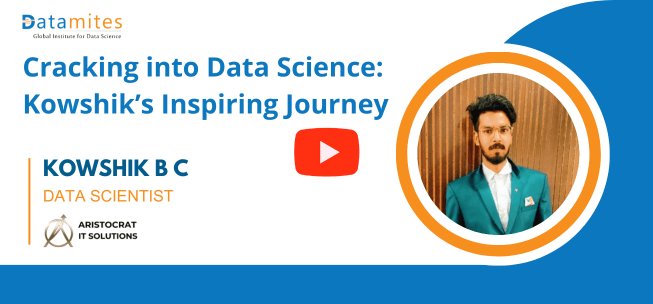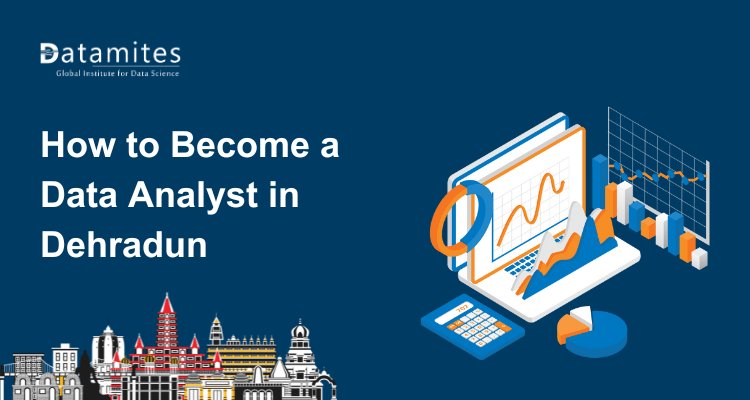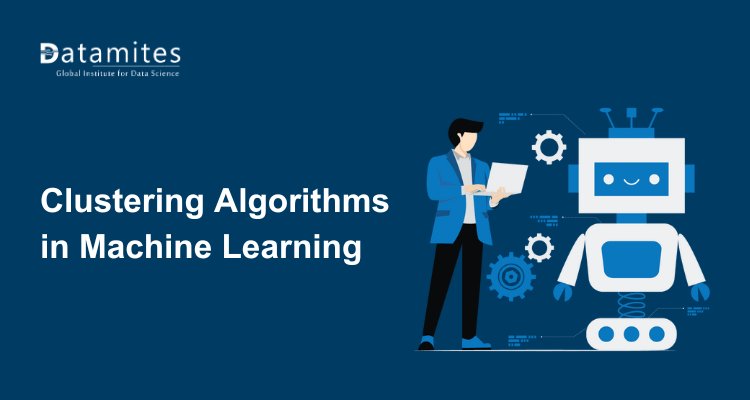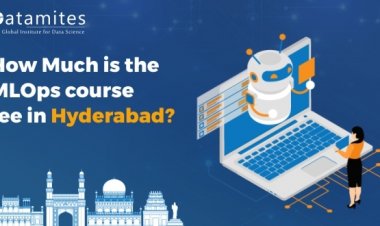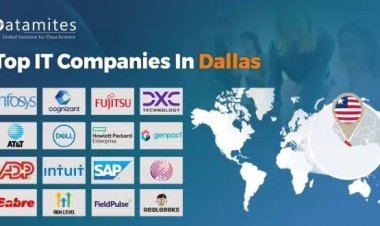Cracking into Data Science: Kowshik’s Inspiring Journey
Kowshik's journey into data science showcases his determination to break into the field despite initial challenges. His story serves as a motivating example for aspiring data professionals.
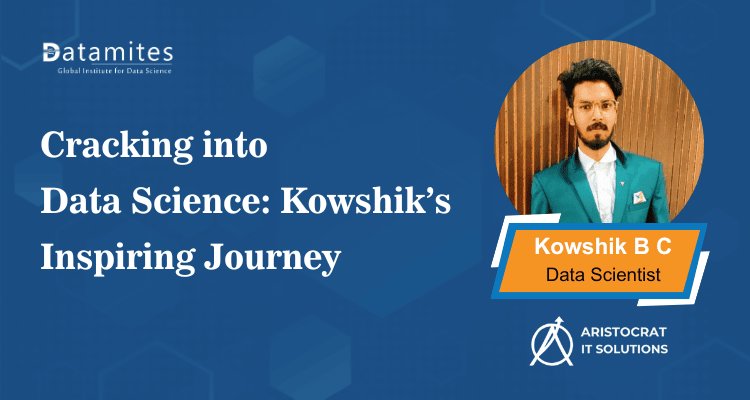
Embarking on a journey to master data science is a significant step for anyone, especially those who come from non-engineering backgrounds. This is a story of resilience, structured learning, and transformation. In this blog, we highlight the inspiring journey of Kowshik, a Bachelor of Computer Science graduate who took the leap into data science through DataMites and successfully transitioned into the field with confidence and competence.
Kowshik's journey offers a relatable and honest insight into the challenges faced by many learners—initial self-doubt, difficulty with coding, and the complexity of real-world projects. Yet, with mentorship, structured curriculum, and dedication, he emerged victorious. This blog captures his interview with a DataMites representative and reveals how structured training, perseverance, and project-based learning shaped his success.
Kowshik’s Path to Data Science Success with DataMites
From overcoming coding fears to landing a Data Scientist role, discover how Kowshik transformed his career with dedication and the right guidance from DataMites.
Q1: Which batch were you a part of and what topics did you learn at DataMites?
I joined the January 2023 batch. During my time at DataMites Institute, I learned several skills including Python, NumPy, Pandas, statistics, machine learning, deep learning, Power BI, and SQL. The mentors were very supportive, always ready to answer our queries and ensure we fully understood the concepts.
Q2: Tell us a bit about your background. What motivated you to step into data science?
I come from a BSc Computer Science background with Mathematics and Physics. I’ve always had a deep interest in Artificial Intelligence, and that curiosity led me toward data science. I explored many institutes in Bangalore before settling on DataMites. Initially, I was nervous, especially about coding, as I felt that engineering students might find it easier than I would. But with the guidance and encouragement from mentors and my relationship manager, I gradually gained confidence.
Q3: How did you handle that initial fear, particularly around coding?
I used to create doubts in my own mind, thinking I couldn’t do it. But DataMites made sure no question was left unanswered. Mentors helped clear doubts patiently, and they guided me thoroughly through every step. The sessions were structured well, and I made it a point to revise each topic after class. I spent at least two hours each day reviewing what I had learned. Over time, this consistent practice helped reduce my fear.
Q4: Was this study routine consistent throughout your course?
Yes, I kept up the habit of revising every day. During weekends, especially Fridays to Sundays, I would go over everything once again. This rhythm helped reinforce my learning. Revisiting earlier topics helped me keep everything fresh and also connected different concepts better.
Q5: How did the transition from learning theory to applying it in projects feel?
The projects were initially very tough. My first one took a long time, and I felt completely lost. But I reached out to mentors, and they guided me patiently. They even suggested tools and strategies to use. As I worked on more projects, things became easier. By my second project, I completed it in two days. I also explored projects outside the curriculum—like Kaggle datasets—and DataMites mentors still supported me through those as well.
Q6: How many projects did you complete, and how important do you think they were in building your skills?
I completed several projects—both within the DataMites curriculum and external ones. Projects are absolutely essential. Theory is important, but only when you try to apply it do you really understand it. In projects, you face real problems and that’s when true learning happens. Practice and implementation are the most crucial parts of mastering data science.
Q7: That’s great! Moving on to the placement phase—how did you prepare for interviews, and what was your experience like?
Before interviews, I made sure I had completed and understood the full syllabus. Initially, I skipped some parts, but I realized later that revisiting and mastering what the mentors had taught was the key. That gave me a solid foundation. Only after that did I start exploring advanced topics or additional tools.
Q8: How did mock interviews help you? Did they contribute to your actual interview performance?
Absolutely. Mock interviews helped me a lot. Before giving a mock interview, I thought I was ready—but when I sat in front of the camera, I got nervous. That experience helped me identify my weak spots. With every mock session, my confidence improved. They also helped improve my communication skills and taught me how to structure my answers.
Q9: In actual interviews, did your project experience help you?
Yes, very much. Real interviews often ask for practical, real-life examples. When I mentioned the projects I had done—especially ones I worked on independently—it really added weight to my answers. Doing real projects gave me the confidence and depth to explain concepts clearly and with context.
Q10: What kind of support did you receive from the DataMites placement team?
The placement team was very supportive. I had made several mistakes while building my resume, and they corrected all of them. They also helped me improve my LinkedIn profile and prepared me for how to talk during interviews. They were constantly in touch, guiding me through each interview process, from scheduling to follow-up.
Q11: How many interviews did you attend, and what was your experience like?
While I was still doing the course, I attended one interview unprepared and didn’t clear it. After that experience, I focused more, completed mock interviews, and felt much better prepared. I attended a total of four interviews—three of them after I completed the course. Two were online and one was offline. Eventually, I got placed as a Data Scientist at Aristocrat IT Solution, which was the job I had been aiming for.
Refer these articles:
- Breaking Into Data Science: Ankita’s Story of Success
- Khushi J’s Leap Into Data Science: A Story of Self-Belief
- Aditya Chowdari’s Inspiring Path to Success in Data Science
Essential Takeaways from Kowshik’s DataMites Journey
Discover the habits, challenges, and breakthroughs that shaped Kowshik’s successful transition into data science.
- Kowshik, a BSc Computer Science graduate, was inspired by his interest in AI to pursue a career in data science.
- He joined the January 2023 batch at DataMites after evaluating multiple training institutes.
- Initially afraid of coding, he overcame his fear through consistent effort and strong mentor support.
- He followed a disciplined study routine, revising daily and doing deep reviews over weekends.
- He learned essential data science tools and concepts like Python, NumPy, Pandas, ML, DL, SQL, and Power BI.
- Hands-on projects were a turning point in his learning, helping him transition theory into real-world applications.
- He completed several internal and external projects, including ones using Kaggle datasets.
- Mock interviews played a crucial role in improving his confidence, communication, and interview readiness.
- His real-world project experience significantly strengthened his performance in job interviews.
- The DataMites placement team helped him with resume writing, LinkedIn optimization, and overall interview guidance.
- After attending four interviews, he successfully secured a Data Scientist role at Aristocrat IT Solution.
Refer these articles:
Kowshik’s inspiring transformation into data science showcases how curiosity, structured learning, and persistence can open doors to a rewarding tech career. With the global data science platform market expected to grow from USD 150.73 billion in 2024 to USD 676.51 billion by 2034 at a CAGR of 16.20% as per Precedence Research, there's never been a better time to break into this high-demand field. For individuals like Kowshik, enrolling in data science training in Bangalore, Hyderabad, Pune, Chennai, and Mumbai can provide a crucial head start.
Choosing the right institute plays a pivotal role in navigating this evolving landscape. Kowshik chose DataMites, a trusted name in data science education, known for its expert-led courses in Data Science, Machine Learning, Python, AI, and Data Analytics. Backed by accreditations from IABAC and NASSCOM FutureSkills, the program offers a curriculum designed to match industry demands. DataMites provides both online and offline data science training in Bangalore, Hyderabad, Chennai, Pune, Ahmedabad, Coimbatore, and Mumbai, making quality education accessible across major cities.
Through a blend of theoretical training, hands-on projects, and consistent mentorship, Kowshik gained the practical skills and confidence to tackle real-world challenges. DataMites’ internship support, mock interviews, and placement assistance ensured he wasn’t just learning—but also progressing toward his career goals. With guidance from dedicated mentors and a focus on applied learning, Kowshik successfully transitioned into a Data Scientist role, demonstrating how the right environment and attitude can drive career success in Data Science.
